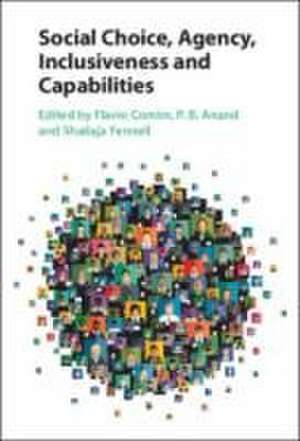Social Choice, Agency, Inclusiveness and Capabilities
Editat de Flavio Comim, P. B. Anand, Shailaja Fennellen Limba Engleză Hardback – 28 feb 2024
Preț: 760.49 lei
Preț vechi: 884.30 lei
-14% Nou
Puncte Express: 1141
Preț estimativ în valută:
145.54€ • 158.03$ • 122.25£
145.54€ • 158.03$ • 122.25£
Carte tipărită la comandă
Livrare economică 23 aprilie-07 mai
Preluare comenzi: 021 569.72.76
Specificații
ISBN-13: 9781009232708
ISBN-10: 1009232703
Pagini: 450
Ilustrații: 19 b/w illus. 23 tables
Dimensiuni: 236 x 158 x 32 mm
Greutate: 0.76 kg
Editura: Cambridge University Press
Colecția Cambridge University Press
Locul publicării:Cambridge, United Kingdom
ISBN-10: 1009232703
Pagini: 450
Ilustrații: 19 b/w illus. 23 tables
Dimensiuni: 236 x 158 x 32 mm
Greutate: 0.76 kg
Editura: Cambridge University Press
Colecția Cambridge University Press
Locul publicării:Cambridge, United Kingdom
Cuprins
Introduction: social choice, agency, inclusiveness and capabilities Flavio Comim, P. B. Anand and Shailaja Fennell; 1. The many facets of social choice theory Wulf Gaertner; 2. Beyond capabilities? Sen's social choice approach Flavio Comim; 3. Examining the challenge of communication in diffusing innovative education programmes: an analysis drawing on public choice, social choice and capability framings Shailaja Fennell; 4. Nudging the capabilities for a sustainable city? When the libertarian paternalist meets the paretian liberal P. B. Anand; 5. Strengthening research capacity in Northern Nigeria: identity, choice and capability Michael Watts, Nafisa Waziri and Oladele Akogun; 6. In defence of inclusiveness: on sustainable human development, capability and indicators of progress Mozaffar Qizilbash; 7. Exploring sen on self-interest and commitment Gay Meeks; 8. Incorporating an emotional dimension in the capability approach John Cameron; 9. Sufficiency reexamined Jay Drydyk; 10. Adaptive preferences vs Internalisation in deprivation: conceptual comparison between the capabilities approach and the self-determination theory Tadashi Hirai; 11. Capabilities and relational ontologies: Sen and indigenous theories of development Ana Estefania Carballo; 12. Creativity and capabilities: a problem of change and uncertainty? Jonathan Warner; 13. 'Measuring the Independence of 'Dependent' persons based on the capability approach' Hideyuki Kobayashi and Reiko Gotoh; 14. Indigenous challenges to the capability approach: a relational ontology of community and sustainability Ana Estefania Carballo; 15. Situating the family within the capabilities framework: a collective conversion factor. The role of the household configuration in the quality of life in Mali Claudine Sauvain-Dugerdil and Siaka Cissé; 16. An ethical perspective on the UK's improving lives: the future of work, health and disability Jacques Tamin; 17. Public services as conversion factors: exploring the theory and practice Richard Brunner and Nick Watson.
Descriere
Social choice & the capability approach; issues of social vs collective agency; a rich discussion of key human development applications.
